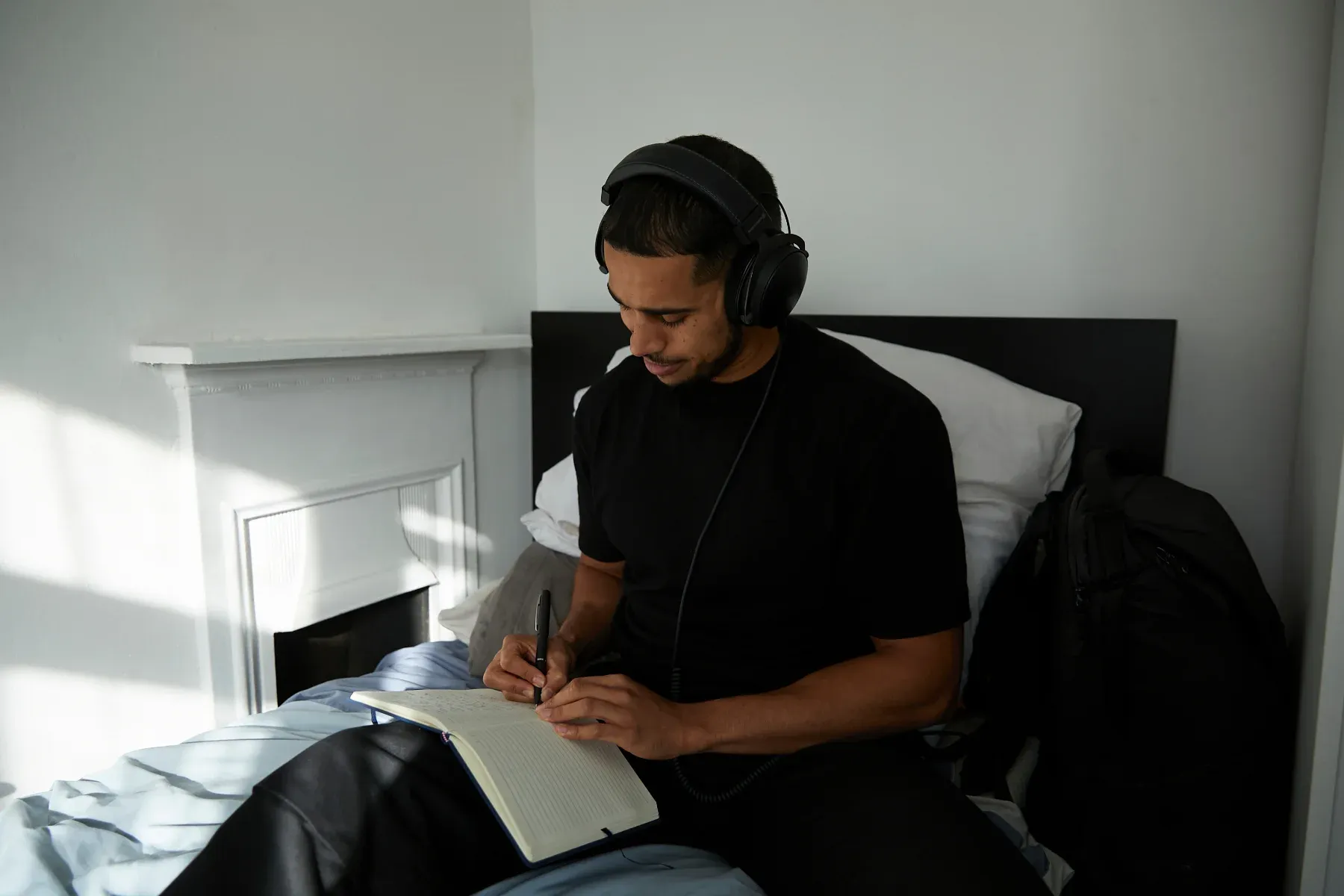The Benefits of Journaling Before Bed: Stress Relief, Clarity & Better Sleep
Chilipad Editorial Team • Oct 20, 2025

Key Takeaways
Writing before bed helps clear mental clutter and prepares your brain for rest.
- Journaling before sleep helps unload worries by putting thoughts and emotions into words, which can reduce nighttime rumination.
- The practice can calm the nervous system, lowering stress and anxiety levels before bedtime.
- A clearer mind makes it easier to fall asleep and stay asleep through the night.
- Regular reflection builds emotional awareness and can support a steadier mood over time.
- Turning journaling into a nightly habit helps signal to your brain that it’s time to wind down and transition into sleep.
Falling asleep isn’t always as easy as hitting the pillow and falling asleep, especially when your mind’s still running through the day’s events or tomorrow’s list to complete. Journaling in bed has become a go-to wind-down ritual, and for good reason.
According to sleep research, people who spent just five minutes writing down future tasks before bed fell asleep faster than those who didn’t. [1] The practice of journaling before bed has been linked to reduced sleep onset latency.
It’s a simple yet effective way to quiet mental noise, ease stress and anxiety, and give your brain the signal that it’s time to shut down for the night. Beyond better sleep, journaling also supports mental health by helping you process emotions, reduce stress, and quiet racing thoughts.
So, how exactly does writing your thoughts and feelings on paper help you sleep better? Below, we'll look more into the science behind why journaling works so well for some at bedtime.
Improved Sleep Quality
Turns out, journaling isn’t just for venting or tracking your day, it can actually help you sleep better. A recent study involving 41 college students found that those who wrote about positive experiences before bedtime experienced less worry, slept longer, and reported an overall improvement in their sleep quality. [2]
**Note: **Before bed, grab your gratitude journal and jot down what you’re thankful for—whether it’s from the day, week, or month. It’s a small habit with a big impact. About 52% of women and 44% of men make gratitude journaling a regular practice, and it’s one worth joining.
Why does it work? It works because focusing on the good stuff helps shift your brain away from stress spirals and into a more relaxed, sleep-friendly mode. Whether it’s a quick note about a win at work or a funny moment from your day, this small habit can help you wind down, reduce stress, and wake up feeling more refreshed.
Unplug and Cool Down Right
Clear your mind with a journal. Cool your body with the Chilipad. Pair them up for your best restful night’s sleep yet.
Reducing Bedtime Worry
Have you ever found yourself lying in bed, staring at the ceiling with thoughts racing through your mind? These thoughts typically include everything you didn’t get done, or worrying about unfinished tasks, stressing over your list? You're definitely not alone in this, and research actually shows that those nonstop thoughts can make it take longer for you to feel sleepy.
Note: A worry list helps you get upcoming anxieties out of your head and onto paper, so you can face the next few day with a little more clarity and a lot less stress.
In a study that was published in the Journal of Experimental Psychology, researchers looked at how bedtime writing affects sleep. [3] The sleep study asked one group of people to write down what they needed to do the next day (Items included laundry, emails, pick up dog food, etc), while another group wrote about tasks they had already completed.
The results? The “to-do list” group fell asleep about 10 minutes faster than those who reflected on what they’d already accomplished.
The reason is straightforward: unloading your mental checklist before turning off the lights helps to silence that constant background stress loop. By transferring your plans onto paper, your brain can relax, no longer burdened with trying to remember everything all at once.
So next time you're feeling wired at bedtime, put down your cellphone and grab a notebook and write down tomorrow’s tasks. It doesn’t need to be long, just jot down your tasks and thoughts.
Mental Clarity: Clear Your Head Before Bed
Writing things out helps you see the bigger picture, what really matters, what can wait, and what deserves your energy tomorrow. Whether you’re mapping out your work schedule, thinking through tomorrow’s priorities, or just offloading ideas to get them out of your head, bedtime journaling helps you get ready for sleep.
And it’s not just about productivity; this small habit can be a powerful tool for managing anxiety, depression, sleep disorders, PTSD, or even health-related stress like diabetes.
Note: If you are struggling with sleep disorders, such as insomnia, sleep journaling and keeping a sleep diary or sleep log can help you understand the issues affecting your sleep.
Whether you’re working remotely across time zones or clocking out from your 9-to-5, sleep journaling can help you log off mentally and start tomorrow with more clarity.
Reduced Sleep Onset Latency
Do you often find yourself struggling to get to sleep instead of resting peacefully? It's known as sleep onset latency. It's the stretch of time between lying down and falling asleep. When your brain’s still running through tomorrow’s to-dos or replaying today’s actions, sleep onset latency can spike, leaving you restless and frustrated, resulting in difficulty falling asleep.

Boosted Emotional Health
Stress, anxiety, and racing thoughts have a way of showing up right when you’re trying to wind down. For most of us, the moment it gets quiet, your brain turns up the volume. That’s why building a bedtime journaling habit can be so helpful, it helps clear the mental noise so you can actually relax and get a good night's sleep.
Did You Know: Minimize distractions during your journaling time by finding a quiet space to focus.
Keeping a sleep diary or journaling before bed isn’t just about logging how many hours you slept. It can help take the edge off anxiety, depression, and even PTSD by giving you space to sort through your thoughts, steady your emotions, and calm your nervous system, all naturally.
Note: A sleep diary and a sleep log are designed to track your sleep habits, not necessarily your thoughts or feelings. Writing about negative emotions—like frustration, guilt, or worry—can stop them from looping in your head all night. It’s a healthy way to release tension and make space for calmer thoughts.
Here’s how it helps:
- Emotional Offloading: Getting your thoughts on paper helps shift them out of your head. You’re not suppressing emotions, you’re processing them, which makes them easier to manage.
- Pattern Spotting: By tracking your mood, sleep quality, and stress levels, you can start noticing triggers (like that 4 PM coffee or scrolling before bed) that affect your sleep and emotional health.
- Self-Compassion in Real Time: Journaling gives you a chance to check in with yourself. What’s working, what’s hard, and what you might need tomorrow. That simple check-in helps you build emotional strength and stay more in tune with yourself.
Memory Keeping & Better Recall
Not many people realize it, but journaling before bed can actually help improve your memory. When you take time to write down your thoughts, feelings, and the day’s events, you’re doing more than just venting—you’re reinforcing your brain’s ability to retain and recall information.
Putting your experiences on paper, you're helping your mind process and store them more effectively. Over time, this habit strengthens memory retention and makes it easier to spot patterns, track progress, and gain insights from everyday life.
And there’s a bonus: journaling gives you a personal time capsule. Months from now, you can flip back through the pages and see how far you’ve come, what’s changed, or even just relive a great day you’d totally forgotten about.
It’s memory-boosting, emotionally grounding, and 100% side-effect free.
Increases Gratitude & Positive Thinking
Ending the day with a little gratitude is a simple way to improve both your mindset and your sleep. Sleep journaling gives you the space to reflect on what went well, no matter how small. This habit helps shift your focus from stress and scarcity to what’s abundant and working in your life.
And it’s not just a feel-good nighttime exercise; it’s science-backed. Studies show that optimistic individuals are 74% more likely to report no insomnia and less daytime sleepiness compared to those with a more negative outlook. [4] Having a positive mindset doesn’t just feel better, it supports better mental and physical health and helps improve your sleep.
Over time, this journaling can help you handle stress better, feel more upbeat, and drift off more quickly with a clearer, more positive mindset.
Journaling Techniques and Tips
Whether you’re just getting started or already have a journaling practice, here are some practical tips and techniques to make it even more effective. Before you start writing, ask yourself what you want to achieve from your journaling practice.
Tip: Mixing up different types of prompts keeps your journaling practice fresh and engaging.
- Start Small: Just 3–5 minutes each night is enough. You don’t need to write a novel—being consistent matters more than writing a lot.
- Use Prompts: Try simple questions like, “What went well today? What stressed me out? What do I need to remember for tomorrow?”
- Go Analog or Digital: Choose the format that feels most natural and sustainable for you. Love pen and paper? Grab a notebook you enjoy writing in. Prefer your phone? Apps like Day One, Reflectly, and Five Minute Journal make bedtime journaling easy with mood tracking, prompts, and even the option to add photos or media. Use whatever keeps you consistent.
- Try Task List Dumping: Write down tomorrow’s tasks to clear mental clutter and help your brain power down.
- Practice Gratitude: List 1–3 things you’re thankful for each night. It boosts positivity and helps shift your focus before bed.
- Don’t Overthink It: Forget about perfect grammar, spelling, or neatness. Just focus on getting your thoughts down.
- Be Honest: This is your personal space. Write freely and openly, even if your thoughts feel messy or unfiltered.
- Review Occasionally: Skim past entries every few weeks to notice patterns, wins, or things you’ve worked through.
- **Pair It With Wind-Down Time:**Ready to upgrade your nightly wind-down? Start by integrating journaling into your established bedtime routine. Dedicate a specific, quiet moment: perhaps after brushing your teeth or right before you power down your phone. This consistent placement makes all the difference in boosting your overall sleep quality. Finally, ensure the habit is sustainable by choosing the right journal that makes you look forward to writing.
- Experiment with Formats: Whether you prefer lists, bullet points, paragraphs, or even doodles, there’s no single right way to journal. Discover what feels most natural and comfortable for you.
Final Thought
Journaling before bed isn't just about writing down your thoughts; it's a powerful, science-backed tool that can help clear negative thoughts and genuinely transform your sleep and overall mental and physicalhealth. From quieting that endless mental chatter and boosting your emotional health to even sharpening your memory, this simple habit offers a surprising number of benefits.
It doesn't have to be a lot, just a few minutes of honest reflection can make a world of difference. So, why not grab a pen and paper (or your favorite app) tonight? A few minutes of journaling can do more than help you sleep—it can also boost your mental health by clearing emotional buildup and helping you end the day with calm and clarity.
Give your brain the signal it's time to truly power down, and discover the calm, clarity, and quality sleep you deserve.
Frequently Asked Questions About Journaling Before Bed
How Long Should I Journal for before Bed?
To get the most benefit from journaling before bed, aim for about 5 to 10 minutes of focused writing. This short session is enough to unload your thoughts, jot down a to-do list for the next day, express gratitude, or capture any worries. Keeping it brief helps declutter your mind without causing stress, making it easier to relax and fall asleep faster.
Is It Good to Journal Every Night?
Yes, journaling every night can be very helpful. It allows you to easily process your thoughts, reduce stress, and clear your mind before sleep. A nightly journaling routine can improve your mood, help you track progress on personal goals, and even support better sleep by letting you release worries or reflect with gratitude.
The key is to keep it simple and focus on what feels helpful for you, whether that’s writing about your day, making a to-do list, or jotting down things you’re grateful for.
What Is the 5 Minute Journal?
The 5 Minute Journal is a quick, guided journaling practice designed to boost positivity and gratitude in just five minutes a day. It includes simple morning and evening prompts to reflect on what you’re grateful for, set intentions, and review your day’s highlights.
This easy routine helps reduce stress, increase self-awareness, and promote a positive mindset with minimal time needed.
Peer-Reviewed Research References
-
Scullin, M.K., et al.
The Effects of Bedtime Writing on Difficulty Falling Asleep: A Polysomnographic Study Comparing To-Do Lists and Completed Activity Lists.
Journal of Experimental Psychology: General, 2018.
Study Type: Polysomnographic Experimental Sleep Study
Key Finding: Found that writing a to-do list before bed significantly reduced sleep onset latency compared to writing about completed activities, suggesting that offloading future tasks helps quiet a racing mind.
View Study
Source URL: https://pubmed.ncbi.nlm.nih.gov/29058942/
-
Andrews, L.W.
Journaling Before Bed Can Help You Sleep.
Healthgrades, 2022.
Source Type: Health & Wellness Editorial (Evidence-Based Summary)
Key Insight: Summarizes sleep research showing that journaling and expressive writing before bed can reduce stress, anxiety, and pre-sleep rumination that interfere with falling asleep.
View Resource
Source URL: https://resources.healthgrades.com/right-care/sleep-disorders/journaling-before-bed-can-help-ward-off-sleeplessness
-
Ibid.
Source Type: Continuation of Prior Peer-Reviewed Study
Key Insight: Reinforces that structured bedtime writing helps reduce cognitive arousal, a major contributor to insomnia and prolonged sleep latency.
Refers to Scullin et al. (2018), Journal of Experimental Psychology: General.
-
Forrest, S.
Optimistic People Sleep Better, Longer, Study Finds.
University of Illinois News Bureau, 2019.
Source Type: University Research News Summary
Key Insight: Reports that higher levels of optimism are associated with longer sleep duration and better sleep quality, likely due to lower stress and healthier coping mechanisms.
View Resource
Source URL: https://news.illinois.edu/optimistic-people-sleep-better-longer-study-finds/









